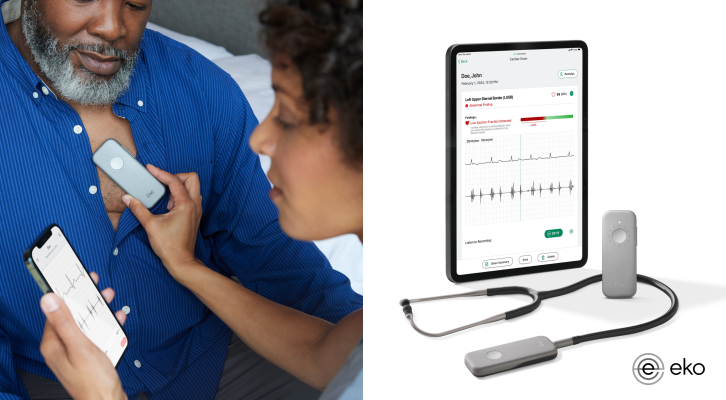
April 3, 2024 — - Eko Health, a pioneer in applying artificial intelligence (AI) for early detection of heart and lung diseases, announces FDA clearance for its Low EF detection AI. For the first time, U.S. healthcare providers can now detect Low EF, a key heart failure indicator, in 15 seconds using an Eko stethoscope during a routine physical examination. This leap in early detection marks both a significant medical innovation and a new era in the detection of cardiovascular disease.
In the U.S., more than 6 million people battle heart failure, with half of them experiencing heart failure with reduced ejection fraction (HFrEF)—a condition marked by the heart's inability to pump blood effectively.1 Traditional heart failure detection tools, such as echocardiography, are often unavailable in primary care settings as they are costly, require specialized training, and add significant time. As a result, many heart failure cases go undiagnosed until symptoms force a specialist or emergency hospital visit, leading to worse patient outcomes and exacerbated healthcare costs.2 Eko's Low EF AI disrupts this status quo by embedding rapid and accessible low ejection fraction detection into a stethoscope exam on the front lines of care.
“The ability to identify a hidden, potentially life-threatening heart condition using a tool that primary care and subspecialist clinicians are familiar with – the stethoscope – can help us prevent hospitalizations and adverse events,” said Dr. Paul Friedman, Chair of the Department of Cardiovascular Medicine at Mayo Clinic in Rochester. “Importantly, since a stethoscope is small and portable, this technology can be used in urban and remote locations, and hopefully help address care in underserved areas.”
The Low EF AI will be added to Eko’s SENSORA Cardiac Early Detection Platform, the latest advancement to the platform which already features FDA-cleared algorithms to identify AFib and structural heart murmurs, often an indicator of valvular heart disease. When Low EF is detected in a primary care exam with SENSORA, access to life-extending treatment can be expedited with a referral to the cardiology department for thorough diagnostic testing and treatment evaluation.
“The stethoscope, the most recognizable symbol of healthcare, touches the lives of an estimated one billion people around the globe every year”, said Connor Landgraf, co-founder & CEO of Eko Health. “With Eko’s Low EF AI, we’ve transformed the icon of medicine into an AI-powered heart failure early detection tool that can help improve access to care for millions of patients, at a fraction of the time and cost of echocardiography. It’s been a privilege to work alongside Mayo Clinic in this groundbreaking endeavor.”
Clinical Development & Validation Highlights:
- Robust AI Training & Validation: Eko’s Low EF AI was trained on a proprietary dataset of over 100,000 ECGs and echocardiogram pairs from unique patients, and was clinically validated in a multi-site, prospective clinical study of 3,456 patients, achieving an AUROC of 0.835 for detection of LVEF <40%, 74.7% sensitivity and 77.5% specificity, demonstrating a strong ability to differentiate between low and normal EF.3
- Imperial College London Independent Validation: An independent validation of the Low EF AI by the Imperial College London, published in Lancet Digital Health, reported an AUROC of 0.85 for detection of LVEF below 40%, 84.8% sensitivity, and 69.5% specificity when deployed on over 1,050 patients across multiple real-world settings. This validation prompted the UK NHS and Imperial College London to extend Eko's deployment to over 100 clinics in London and Wales.4
- Demonstrated Impact in Pregnant Women: A clinical study led by Mayo Clinic involving nearly 1,200 pregnant women in Nigeria highlighted the AI's effectiveness, identifying twice as many cases of pregnancy-related cardiomyopathy than standard care, with an impressive AUROC of 0.98, 100.0% sensitivity, and 79.4% specificity, underscoring its significant potential to assist in the detection and appropriate management of cardiomyopathy in pregnant women, reducing associated disease burden and risk of death.5
For more information: www.ekohealth.com
Find more ACC24 conference coverage here
References:
Centers for Disease Control and Prevention. (2023, January 5). Heart failure. https://www.cdc.gov/heartdisease/heart_failure.htm
Bachtiger P, Kelshiker MA, Petri CF, et al. (2023). Survival and health economic outcomes in heart failure diagnosed at hospital admission versus community settings: a propensity-matched analysis. BMJ Health & Care Informatics, 30:e100718. doi: 10.1136/bmjhci-2022-100718
FDA 510(k) Summary, K233409
Bachtiger, P., et al. (2022). Point-of-care screening for heart failure with reduced ejection fraction using artificial intelligence during ECG-enabled Stethoscope Examination in London, UK: A prospective, observational, multicentre study. The Lancet Digital Health, 4(2).
Adedinsewo DA. (2023, November 13). Screening for peripartum cardiomyopathies using an artificial intelligence enhanced digital stethoscope: a randomized clinical trial [Conference Presentation and Abstract]. AHA 2023, Philadelphia, PA, United States.


 July 31, 2024
July 31, 2024 









